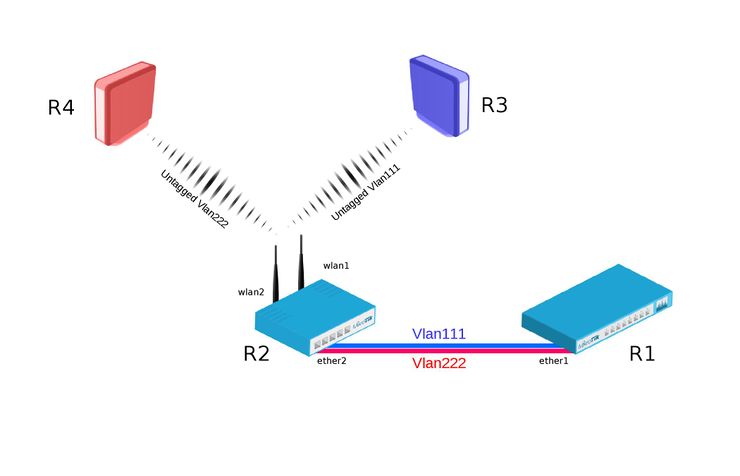Manual:VLANs on Wireless: Difference between revisions
Jump to navigation
Jump to search
No edit summary |
No edit summary |
||
| Line 4: | Line 4: | ||
==Summary== | ==Summary== | ||
Configuration examples | RouterOS supports VLAN on wireless interfaces. Configuration examples contains information about VLAN cooperation with wireless interface features. Both cases work the same way but examples show different approaches how to forward VLANs over wireless interfaces. For example we use wlan1 (Cafe Wifi users) and VirtualAP wlan2 (Wifi for company employees) on one device, and we want to separate both traffics with VLANs. | ||
===Example with separate bridges=== | ===Example with separate bridges=== | ||
| Line 11: | Line 11: | ||
'''R1:''' | '''R1:''' | ||
* Add necessary VLAN interfaces on ethernet interface to make it as a VLAN trunk port. Add | * Add necessary VLAN interfaces on ethernet interface to make it as a VLAN trunk port. Add IP addresses on VLAN interfaces. | ||
<pre> | <pre> | ||
| Line 56: | Line 56: | ||
'''R3:''' | '''R3:''' | ||
* Add | * Add IP address on wlan1 interface. | ||
* Create wireless security-profile compatible with R2 wlan1. | * Create wireless security-profile compatible with R2 wlan1. | ||
<pre> | <pre> | ||
| Line 68: | Line 68: | ||
'''R4:''' | '''R4:''' | ||
* Add | * Add IP address on wlan1 interface. | ||
* Create wireless security-profile compatible with R2 wlan2. | * Create wireless security-profile compatible with R2 wlan2. | ||
<pre> | <pre> | ||
| Line 117: | Line 117: | ||
add interface=ether1 name=vlan110-ether1 vlan-id=110 | add interface=ether1 name=vlan110-ether1 vlan-id=110 | ||
add interface=ether1 name=vlan220-ether1 vlan-id=220 | add interface=ether1 name=vlan220-ether1 vlan-id=220 | ||
add interface=wlan1 name=vlan110-wlan1 vlan-id=110 | |||
add interface=wlan2 name=vlan220-wlan2 vlan-id=220 | |||
/interface bridge | /interface bridge | ||
| Line 129: | Line 131: | ||
'''R3:''' | '''R3:''' | ||
* Add | * Add IP address on wlan1 interface. | ||
* Create wireless security-profile compatible with R2 wlan1. | * Create wireless security-profile compatible with R2 wlan1. | ||
<pre> | <pre> | ||
Revision as of 15:07, 11 January 2017
Summary
RouterOS supports VLAN on wireless interfaces. Configuration examples contains information about VLAN cooperation with wireless interface features. Both cases work the same way but examples show different approaches how to forward VLANs over wireless interfaces. For example we use wlan1 (Cafe Wifi users) and VirtualAP wlan2 (Wifi for company employees) on one device, and we want to separate both traffics with VLANs.
Example with separate bridges

R1:
- Add necessary VLAN interfaces on ethernet interface to make it as a VLAN trunk port. Add IP addresses on VLAN interfaces.
[admin@R1] > /interface vlan add interface=ether1 name=vlan110 vlan-id=110 add interface=ether1 name=vlan220 vlan-id=220 /ip address add address=192.168.1.1/24 interface=vlan110 network=192.168.1.0 add address=172.168.1.1/24 interface=vlan220 network=172.168.1.0
R2:
- Add VirtualAP under wlan1 interface. (Also create wireless security-profiles for wlan1 and wlan2)
[admin@R2] > /interface wireless set [ find default-name=wlan1 ] disabled=no mode=ap-bridge security-profile=vlan110 ssid=vlan110 add disabled=no master-interface=wlan1 name=wlan2 security-profile=vlan220 ssid=vlan220
- Add necessary VLAN interfaces on ethernet interface to make it as a VLAN trunk port.
- Add bridges for each VLAN.
- Add VLAN interfaces to their corresponding bridges and wireless interfaces to each bridge.
[admin@R2] > /interface vlan add interface=ether1 name=vlan110-ether1 vlan-id=110 add interface=ether1 name=vlan220-ether1 vlan-id=220 /interface bridge add name=bridge-vlan110 add name=vlan220-bridge /interface bridge port add bridge=bridge-vlan110 interface=vlan110-ether1 add bridge=bridge-vlan110 interface=wlan1 add bridge=vlan220-bridge interface=vlan220-ether1 add bridge=vlan220-bridge interface=wlan2
R3:
- Add IP address on wlan1 interface.
- Create wireless security-profile compatible with R2 wlan1.
[admin@R3] > /ip address add address=192.168.1.3/24 interface=wlan1 network=192.168.1.0 /interface wireless set [ find default-name=wlan1 ] disabled=no security-profile=vlan110
R4:
- Add IP address on wlan1 interface.
- Create wireless security-profile compatible with R2 wlan2.
[admin@R4] > /ip address add address=172.168.1.4/24 interface=wlan1 network=172.168.1.0 /interface wireless set [ find default-name=wlan1 ] disabled=no security-profile=vlan220
Example with vlan-mode usage
R1:
- Add necessary VLAN interfaces on ethernet interface to make it as a VLAN trunk port. Add ip addresses on VLAN interfaces.
[admin@R1] > /interface vlan add interface=ether1 name=vlan110 vlan-id=110 add interface=ether1 name=vlan220 vlan-id=220 /ip address add address=192.168.1.1/24 interface=vlan110 network=192.168.1.0 add address=172.168.1.1/24 interface=vlan220 network=172.168.1.0
R2:
- Add VirtualAP under wlan1 interface. (Also create wireless security-profiles for wlan1 and wlan2)
[admin@R2] > /interface wireless set [ find default-name=wlan1 ] disabled=no mode=ap-bridge security-profile=vlan110 ssid=vlan110 vlan-id=110 vlan-mode=use-tag add disabled=no master-interface=wlan1 name=wlan2 security-profile=vlan220 ssid=vlan220 vlan-id=220 vlan-mode=use-tag
- Add necessary VLAN interfaces on ethernet,wlan1,wlan2 interfaces.
- Add bridge for VLAN interfaces.
- Add all VLAN interfaces to bridge1.
[admin@R2] > /interface vlan add interface=ether1 name=vlan110-ether1 vlan-id=110 add interface=ether1 name=vlan220-ether1 vlan-id=220 add interface=wlan1 name=vlan110-wlan1 vlan-id=110 add interface=wlan2 name=vlan220-wlan2 vlan-id=220 /interface bridge add name=bridge1 /interface bridge port add bridge=bridge1 interface=vlan110-wlan1 add bridge=bridge1 interface=vlan220-wlan2 add bridge=bridge1 interface=vlan110-ether1 add bridge=bridge1 interface=vlan220-ether1
R3:
- Add IP address on wlan1 interface.
- Create wireless security-profile compatible with R2 wlan1.
[admin@R3] > /ip address add address=192.168.1.3/24 interface=wlan1 network=192.168.1.0 /interface wireless set [ find default-name=wlan1 ] disabled=no security-profile=vlan110
R4:
- Add ip address on wlan1 interface.
- Create wireless security-profile compatible with R2 wlan2.
[admin@R4] > /ip address add address=172.168.1.4/24 interface=wlan1 network=172.168.1.0 /interface wireless set [ find default-name=wlan1 ] disabled=no security-profile=vlan220
